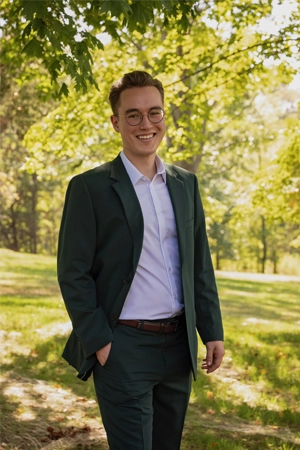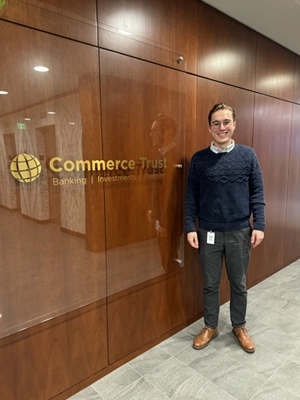11-29-2024
"Finding a deeper logic and awareness of how the world works is one of the more underrated benefits of an education in economics," says Daniels School of Business alum Wolf Williams (MSEcon ’22).
As a financial content writer at Commerce Trust in St. Louis, Missouri, Williams combines his analytical expertise with creative passions. His journey challenges the traditional track for graduates with economics degrees, showcasing how the field opens doors to diverse opportunities.

Purdue beginnings
Williams’ path to Purdue began with a simple Google search. “I literally googled ‘best online economics graduate programs,’ and Purdue showed up right at the top. Then I applied, got accepted and the rest is history,” he recalls.
His decision to pursue Purdue’s online MS in Economics stemmed from a desire to gain a quality degree without attending in-person classes during the pandemic.
At Purdue, Williams worked for the Purdue University Research Center in Economics (PURCE) as an economics communications specialist. He continues to freelance for PURCE, translating economic theory and research into digestible narratives.
“My favorite part about the position is how much fascinating economic research I get to read from Purdue economists. I get to learn everything, from the effects of school bullying on skill development to how short-term rentals affect housing prices,” he says.
Economics meets creativity
As a content writer for the wealth management division of a bank, he navigates a highly regulated and complex industry where precision and clarity are non-negotiable. This requires not only a strong grasp of economic and financial concepts but also the ability to make them engaging and accessible to a wide audience.
“In order to make the content accessible, you need a decent understanding of the concepts involved. My knowledge of economic concepts, data and policy come in handy, especially when I’m collaborating with subject matter experts,” he explains.

Williams’ career illustrates the often-overlooked intersections between economics and creativity. This role reflects his creative roots.
“My interests have always leaned toward creative pursuits ever since I was a kid. I especially loved theater arts and anything to do with acting, singing and admittedly bad dancing,” he says, recalling his early life performances.
Academic foundations and career impact
Williams credits his master’s in economics with providing the tools for his success. “My education honed my critical thinking skills and helped me familiarize myself with concepts that I need to understand to do my job well,” he says.
Key concepts and theories he learned in classrooms gave him practical insights he often applies in his work. “I write quite a bit about taxes, so I find myself drawing on the knowledge I gained in Jillian Carr’s Public Economics course. Additionally, the Wage Discrimination course by Timothy Bond and the Health Economics course by Tim Moore were great for broadening my perspective on the world around me,” he explains.
Beyond academics, Williams emphasizes the importance of the relationships he built during the program. “The people I met in my program were so great. Getting to know them helped me identify my career interests and helped tremendously with learning the course content,” he says.
Reflecting on the journey
Reflecting on his journey, Williams — who considers himself to be a “quantitative creative” — emphasizes the versatility of an economics degree.
“My professional journey has been informed by my interests, and I feel an economics degree can supplement a wide range of careers. Writing has always come naturally to me, so I found it to be a natural career fit,” he says.
If you would like to receive more information about pursuing a business master’s at the Mitch Daniels School of Business, please fill out the form and a program specialist will be in touch!